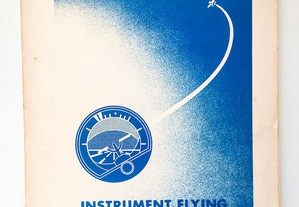FAA, Instrument Flying Handbook
FAA, Instrument Flying Handbook
Preço: 21 €
FAA, Instrument Flying Handbook
FAA, Instrument Flying Handbook
U.S. Department of Transportation
Federal Aviation Administration
Ac 61-27C
Training Considerations
Why Get An Instrument Rating? Requirements For the Instrument Rating: Training For the Instrument Rating; Instrument Curriculum. Ii. Instrument Flying: Coping With Illusions In Flight Sensory Systems For Orientation; Illusions Leading To Spatial Disorientation: Aircraft Maneuvers For Demonstrating Spatial Disorientation; How To Cope With Spatial Disorientation; Illusions Leading To Landing Errors: How To Prevent Landing Errors From Visual Illusions. Iii. Aerodynamic Factors Related To Instrument Flying Aerodynamic Forces; Straight-And-Level Flight; Climbs; Descents; Power, Air Speed and Vertical Speed; Power, Airspeed and Elevator Control: Trim; Turns; Forces Acting On An Aircraft In Turns: Changes In Lift In a Turn; Angle of Bank and Rate of Turn; Drag Factors In Turns; Constant Rate Turns: Load Factors and Angle of Bank; Slips and Skids: Coordination of Rudder and Aileron Controls. Basic Flight Instruments Pitot Static Instruments; Altitude and Height Measurement; Pressure Altimeter; Encoding Altimeter, Radar Altimeter; Vertical-Speed Indicator; Airspeed Indicator; Types of Airspeed: True Airspeed Indicator: Mach Indicator; Gyroscopic Instruments: Sources of Power For Gyro Operation; Attitude Indicators; Trends In Attitude Indicator Design; Turn and Slip Indicator: Turn Coordinator; Heading Indicators; Vacuum-Driven Heading Indicator; Azimuth Heading Indicator; Remote Indicating Compass; Radio Magnetic Indicator (Rmi): Hori
Zontal Situation Indicator (Asi): Integrated Flight System (Flight Director System). V. Attitude Instrument Flying
U.S. Department of Transportation
Federal Aviation Administration
Ac 61-27C
Training Considerations
Why Get An Instrument Rating? Requirements For the Instrument Rating: Training For the Instrument Rating; Instrument Curriculum. Ii. Instrument Flying: Coping With Illusions In Flight Sensory Systems For Orientation; Illusions Leading To Spatial Disorientation: Aircraft Maneuvers For Demonstrating Spatial Disorientation; How To Cope With Spatial Disorientation; Illusions Leading To Landing Errors: How To Prevent Landing Errors From Visual Illusions. Iii. Aerodynamic Factors Related To Instrument Flying Aerodynamic Forces; Straight-And-Level Flight; Climbs; Descents; Power, Air Speed and Vertical Speed; Power, Airspeed and Elevator Control: Trim; Turns; Forces Acting On An Aircraft In Turns: Changes In Lift In a Turn; Angle of Bank and Rate of Turn; Drag Factors In Turns; Constant Rate Turns: Load Factors and Angle of Bank; Slips and Skids: Coordination of Rudder and Aileron Controls. Basic Flight Instruments Pitot Static Instruments; Altitude and Height Measurement; Pressure Altimeter; Encoding Altimeter, Radar Altimeter; Vertical-Speed Indicator; Airspeed Indicator; Types of Airspeed: True Airspeed Indicator: Mach Indicator; Gyroscopic Instruments: Sources of Power For Gyro Operation; Attitude Indicators; Trends In Attitude Indicator Design; Turn and Slip Indicator: Turn Coordinator; Heading Indicators; Vacuum-Driven Heading Indicator; Azimuth Heading Indicator; Remote Indicating Compass; Radio Magnetic Indicator (Rmi): Hori
Zontal Situation Indicator (Asi): Integrated Flight System (Flight Director System). V. Attitude Instrument Flying
- TipoVenda
- ConcelhoSintra
- FreguesiaAlgueirão-Mem Martins
- Id do anúncio33678167
- Id do anuncianteLV01525
Etiquetas: Outros géneros
Contactar o anunciante
Indigo
Anunciante desde Jul. 2013 PRO
Verificado com 12 048 anúncios publicados Sintra - Algueirão-Mem Martins Último acesso há mais de 3 horasTempo de resposta superior a 1 hora







